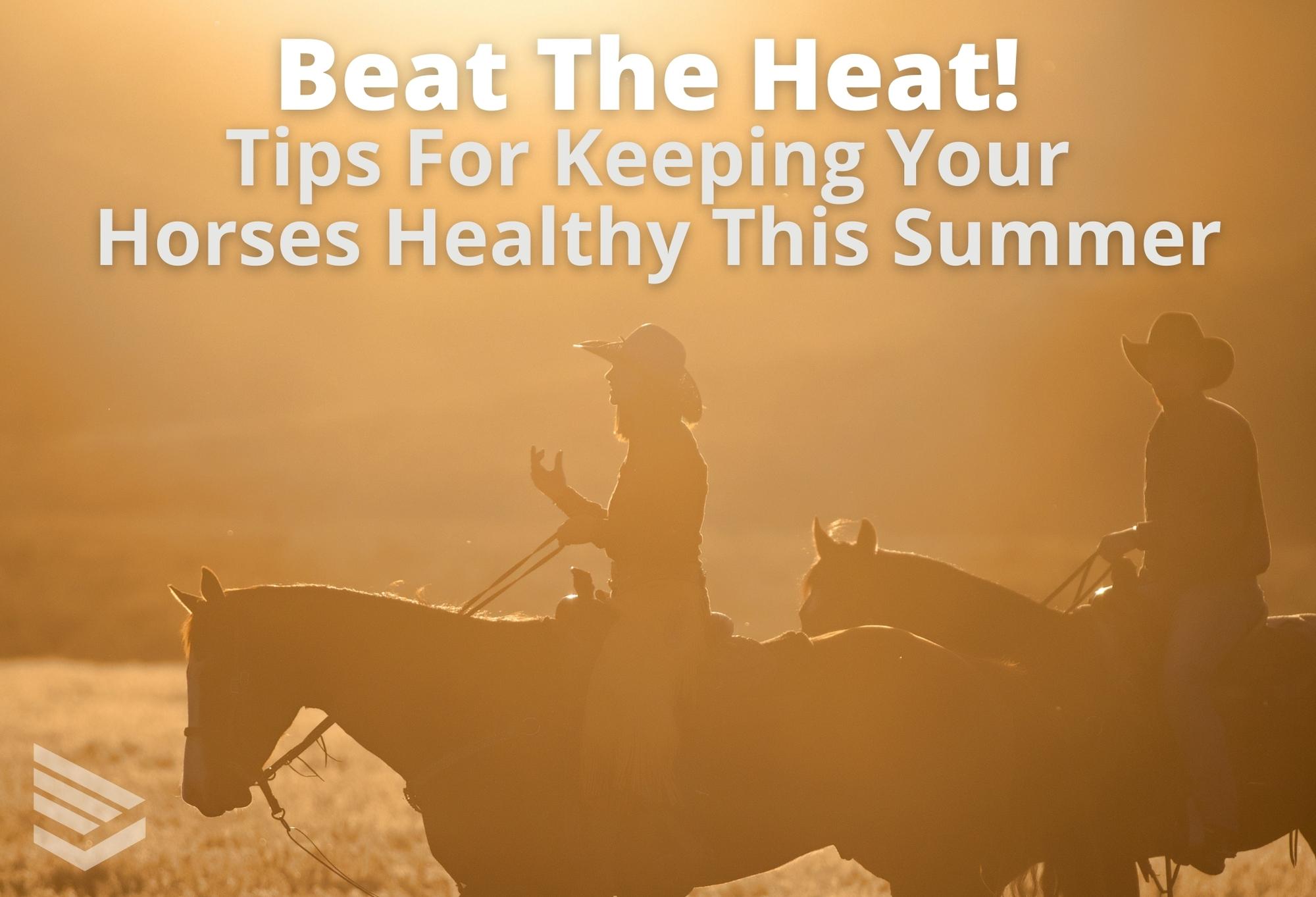Summer is a great time to ride, show, and spend plenty of quality time with our equine partners! While summer can be full of fun and new adventures, it also comes with certain risks. Prolonged exposure to high temperatures can cause heat stress in horses, heatstroke in horses, and problems such as dehydration, muscle spasms, and colic.
Don’t worry! GlobalVetLink has compiled some helpful tips for preventing an exhausted horse and keeping your horse healthy, happy, and comfortable this summer!
How to Keep Horses Cool in Hot Weather
Tip #1. Turnout for Horses
- If your horse is typically stalled during the night and turned out in the pasture during the day, try switching it up! Scheduling turnout at night, during the hottest months of the year, can significantly decrease the impact of heat stress on your horse. When the horse is kept inside during the day, this helps them avoid direct sunlight.
- Try to keep fans going in their stalls. This will also help keep them cool and comfortable at the hottest point in the day.
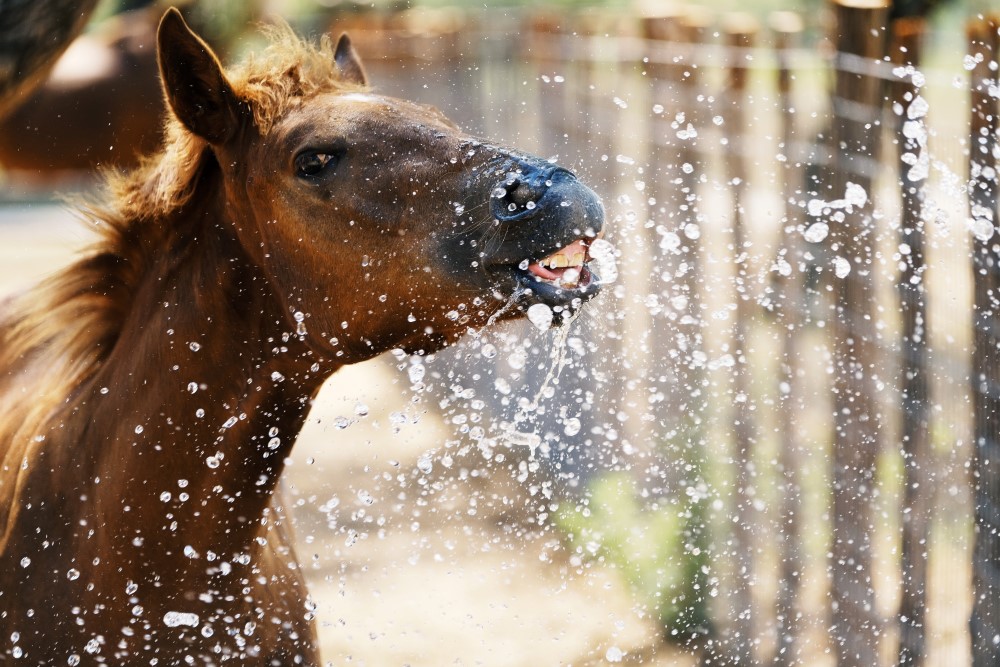
Tip #2. Fans & Shade
- If horses are outside during the day, it’s important to provide an area for them to move away from direct sunlight. Large shade trees and lean-to buildings can be excellent tools that provide a break from the beating sun.
- If possible, try hanging fans in the lean-to buildings to help move some air. This will provide relief from the heat and pesky bugs.
Tip #3. Fresh Water
- It’s very important that your horse has access to fresh, clean water 24/7. At rest, an adult horse in a cool climate will drink about 6 to 10 gallons of water daily. They will drink significantly more while exercising or if they are in hot conditions.
- Consider adding salt to your horse’s feed or provide 24/7 access to salt blocks to encourage them to drink more water.
Tip #4. Fly Control
- Keeping your horse comfortable means keeping the flies away. Excessive stomping can cause stress and increase exercise in the hot weather. Minimizing the amount of flies on and around your horse can help make them much happier this summer.
- Try starting at the source. Stable and house flies breed in manure, organic matter and soiled bedding. Try keeping your stalls, paddocks, and pastures as clean as possible. Manure piles should be located 100 to 200 feet away from the barn to limit flies returning to the area.
- Try using Fly Predators in your manure piles. Fly predators offer fly control by consuming fly pupae in the cocoon.
- Another effective way to start at the source is to add feed-through insecticides to your horse’s daily meals. These supplements are passed through the feces to interrupt developing maggots. Used in conjunction with other fly control methods, it can greatly reduce the population of flies.
- Baits and insect traps can also be effective in reducing the population of flies around the barn.
- Fly sheets, masks and boots are effective in eliminating appropriate landing surfaces for attacking flies. Keep an eye on your horse to make sure the fly sheet is not doing more harm than good. If the horse is too hot with the fly sheet, it might be best to resort to just fly spray for excessively hot days.
Riding & Working Tips
Tip #5. Working With Horses In The Heat
- Avoid riding a horse when the combined temperature and relative humidity is over 150. Older, overweight, and very young foals are most likely to experience heat stress.
- If you live in a hot, humid climate during the summer, try riding early in the morning or late at night to avoid the peak temperatures of the day.
- If you have a shaded or breezy area to ride, try to utilize it.
- Taking frequent breaks can also be beneficial in letting your horse cool down.
- Do horses sweat? Yes they do! And it’s important that you watch for excessive amounts of sweating and abnormal, heavy breathing. These may indicate heatstroke or heat stress in your horse.
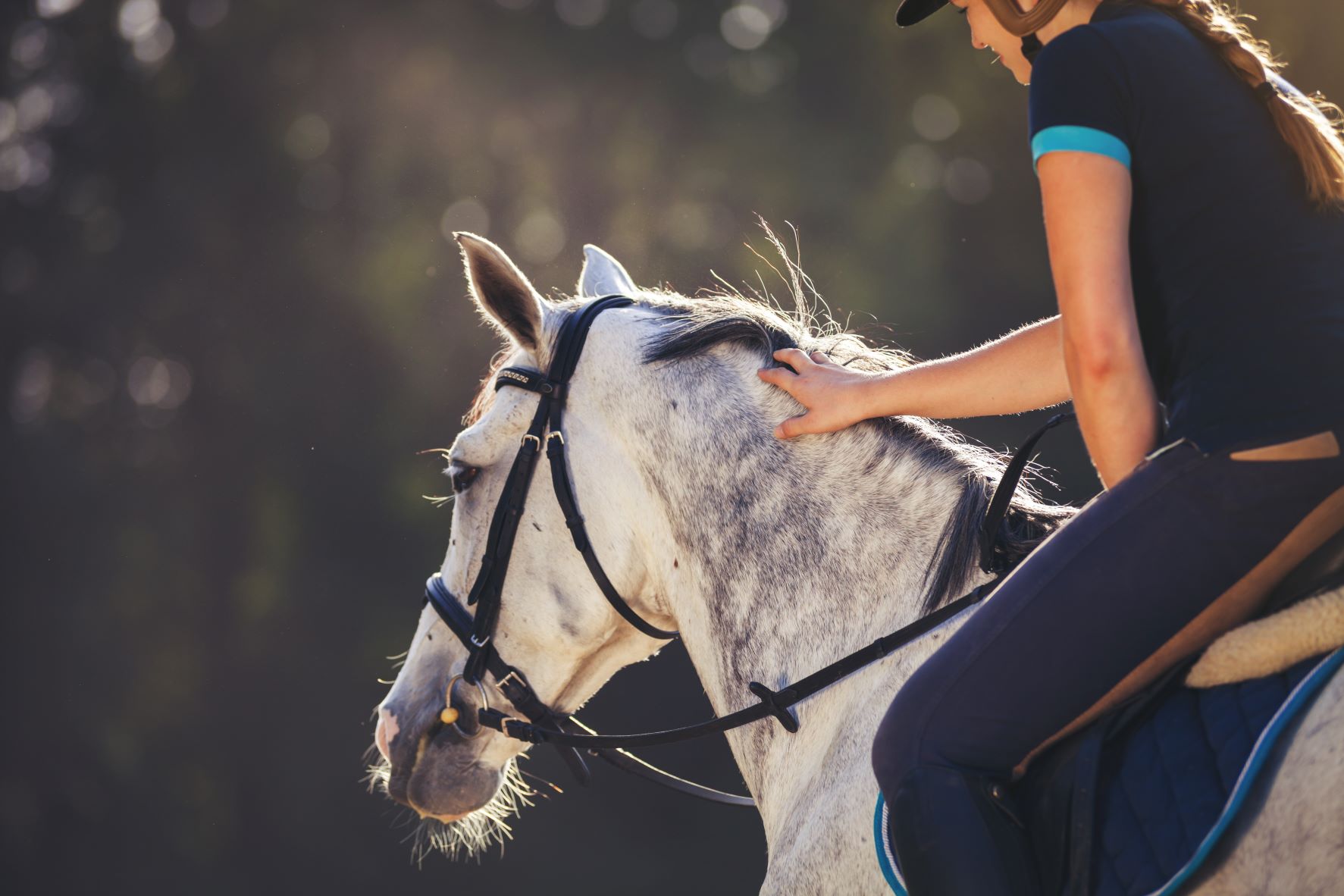
Tip #6. Cooling Your Horse Down
- Should you hose a horse in hot weather? Yes, spray the horse’s head, back, neck, rump, and legs with a steady stream of cool water. Repeat this continuously until the horse is cool.
- For better results, try focusing on cooling the areas where the blood vessels are more prominent: head, neck, back, and rib area.
Trailer Safety
Tip #7. Maximize Airflow
- Research shows that, on a sunny day, a trailer can be up to 20-30 degrees hotter on the inside.
- Open all of the trailer vents and sliding windows as wide as possible for maximum airflow. If the trailer has roof vents, open them forward to optimize air intake.
- Drop-down windows can provide exceptional ventilation; however, only leave them dropped if bars or screens are in place in the window opening to prevent the horses from hanging their heads out of the trailer.
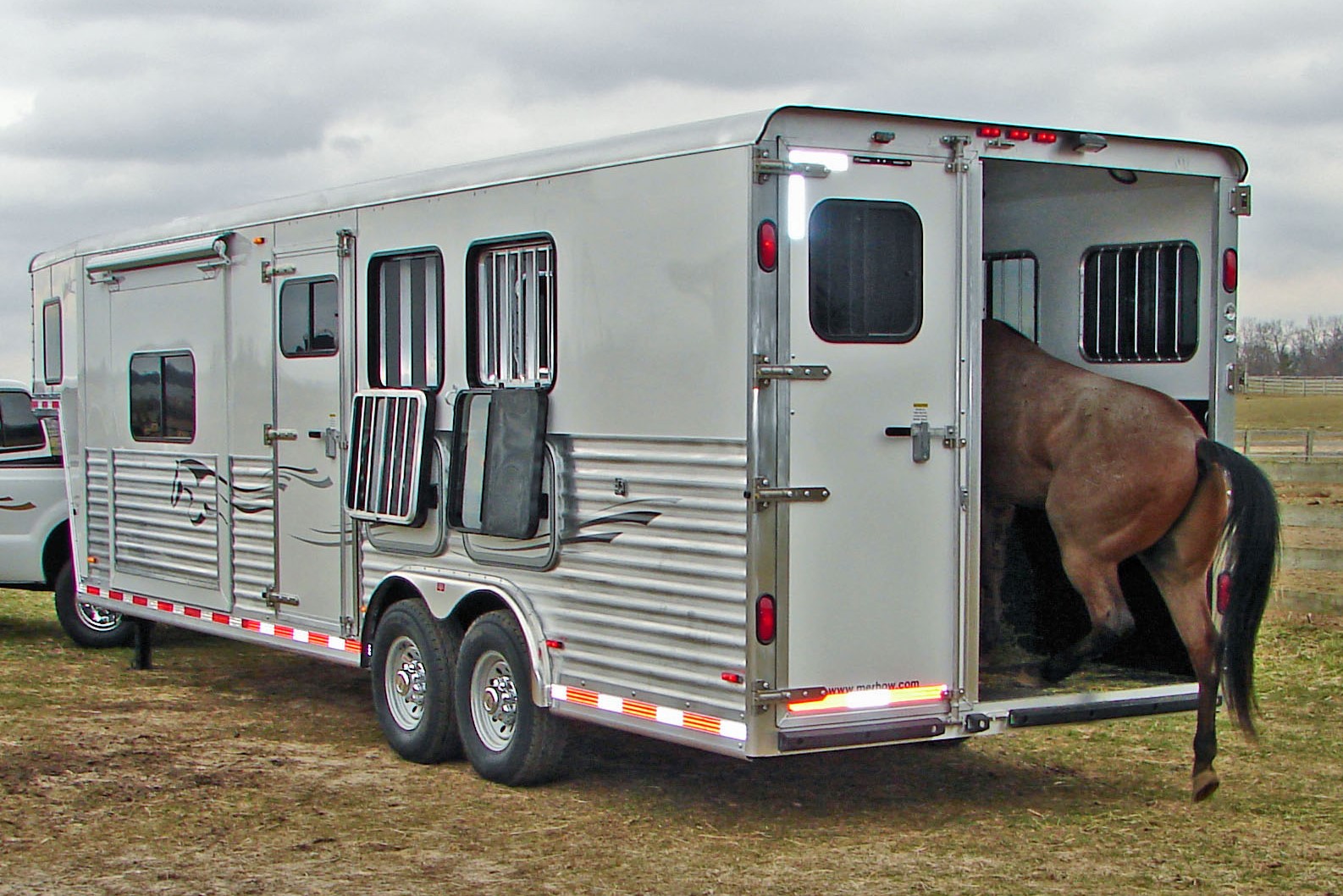
Tip #8. Offer Cool, Clean Water
- How to keep horses cool in hot weather: It’s recommended you should stop every four to six hours for rest and watering breaks. Each stop should be at least 20 minutes long to allow time for your horse to relax and rest as well as urinate.
- Try to park in the shade whenever you stop and do not leave your horse in a parked trailer for an overly long time. Lack of air flow while parked will rapidly increase the trailer’s interior temperature.
Tip #9. Leg Protection: Friend or Foe?
- Boots and bandages insulate the legs and can raise the limb’s internal temperature above normal. Excessive, prolonged heat can damage the tendon in your horse’s legs. For overly hot days, try trailering with the bare minimum, such as just bell boots or no boots/wraps at all.
Health Certificates for Horses
Tip #10. Don’t forget to keep track of your horse’s certificates this summer!
Your animal health information is always within reach with MyVetLink.
MyVetLink provides animal owners with 24/7 access to their records, including health certificates, EIA "Coggins" tests, and rabies vaccination certificates.
- Access health certificates, EIA tests and other animal records anytime from anywhere.
- Create EECVI movement permits.
- Download certificates for offline access.
- Easily search interstate movement requirements for compliant travel.
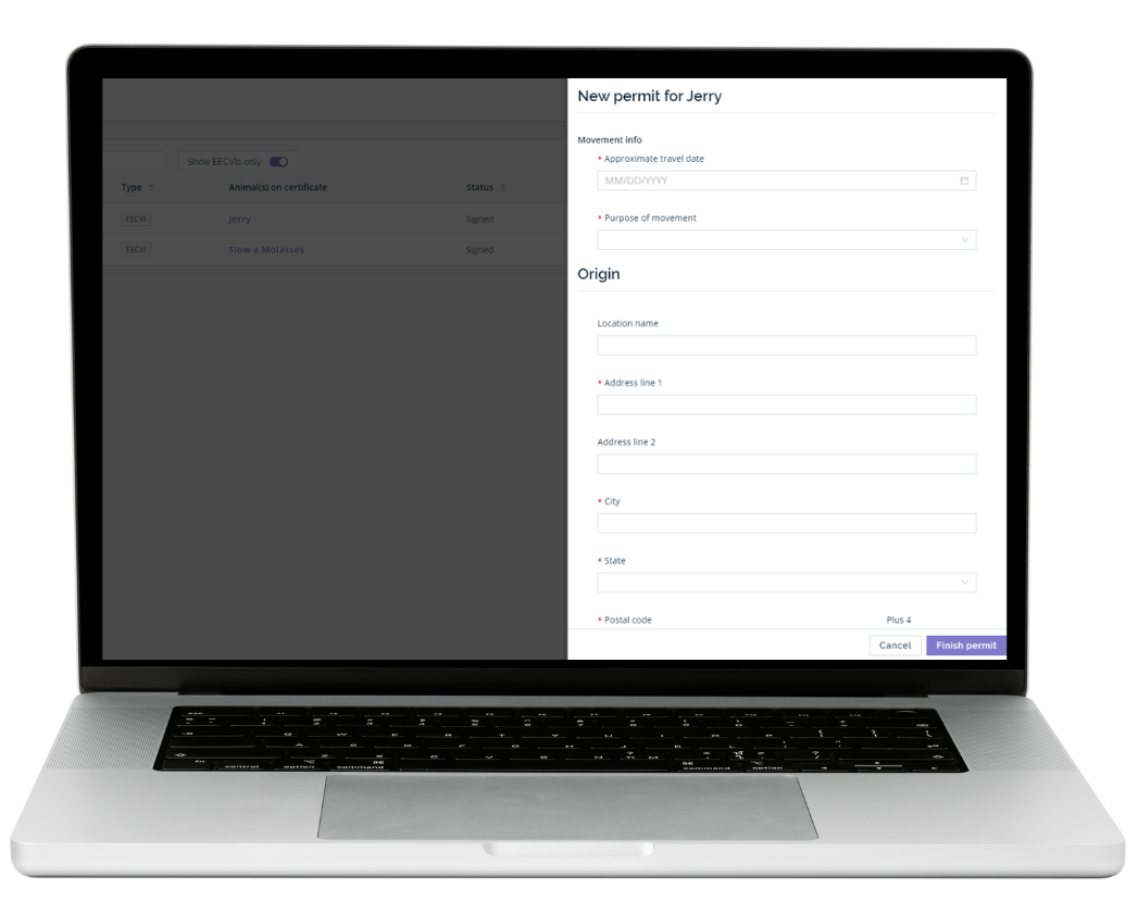
Everyone at GlobalVetLink wishes you safe travels with fun, new adventures this summer! We hope that having your equine partner along with you makes it all the better!
Barakat, Christine. “Tips for Trailering Your Horse in Summer.” Equus Magazine, 26 May 2022, https://equusmagazine.com/horse-care/trailering-horse-in-summer-8380/.
Hagstrom, Debra J. “Tips for Hauling Horses during Hot Weather.” Illinois Livestock Trail, University Of Illinois Extension, 29 July 2008, http://livestocktrail.illinois.edu/horsenet/paperDisplay.
Martinson, Krishona, et al. “Caring for Horses during Hot Weather.” Caring for Horses in Hot Weather, University of Minnesota Extension, 2020, https://extension.umn.edu/horse-care-and-management/caring-horses-during-hot-weather.
Mason, Clara Ann. “Summer Fly Control for Horses.” Dressage Today, 18 May 2020, https://dressagetoday.com/lifestyle/summer-fly-control-horses/.
